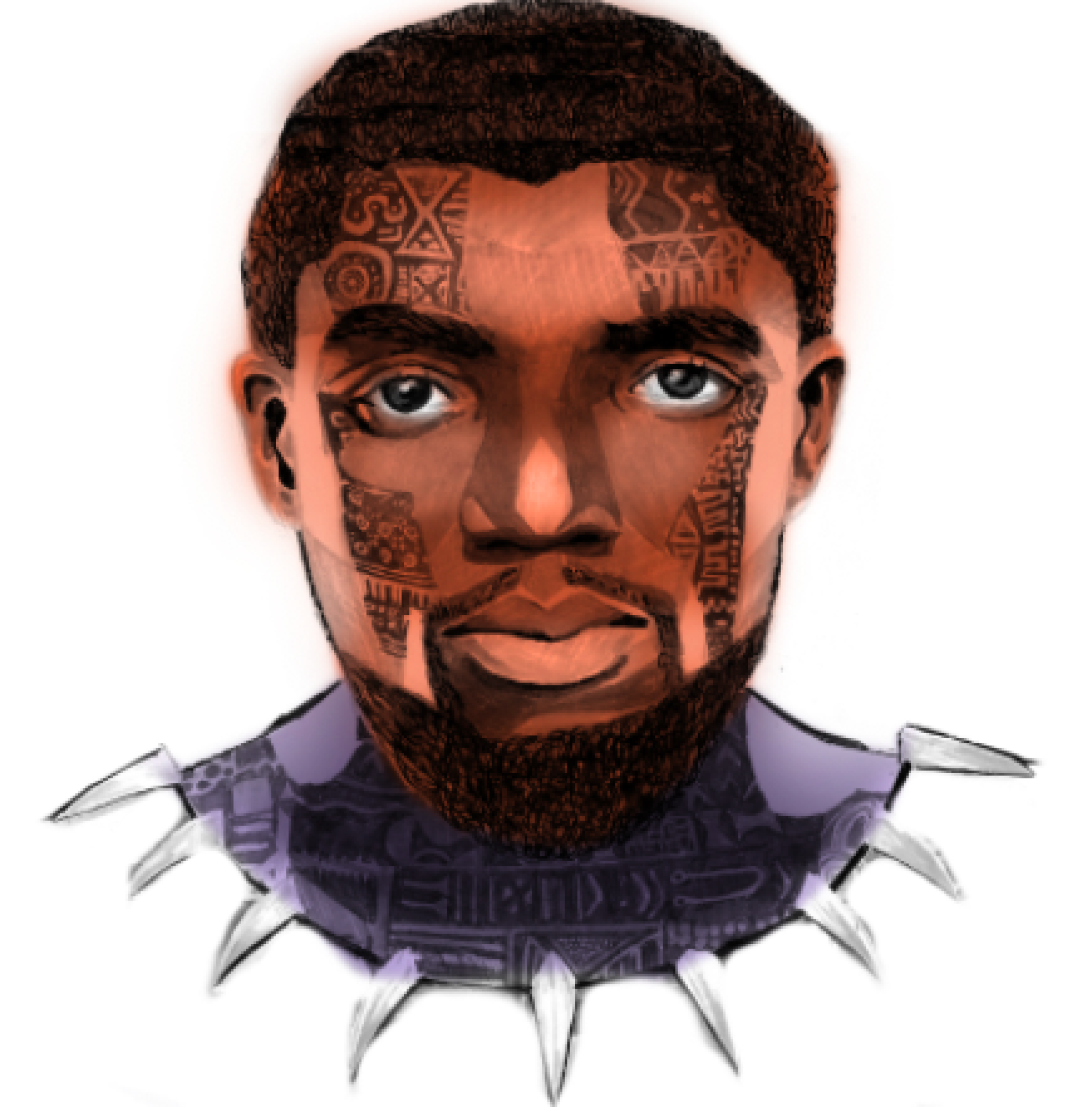Illustration by Gemma Fa-Kaji
We’ve heard the soundtrack, and we’ve known about the cast for months. The hype is as real as it gets. The newest installment in the Marvel Cinematic Universe (MCU), Black Panther, has been highly anticipated since the day Marvel announced the movie was in production. It didn’t come as a surprise to comic book fans, as Black Panther has become an integral part of Marvel Comics, but the anticipation for this film was different from the beginning. One main cause of excitement was its black main character and over 90 percent black cast, a first in MCU history. It represented something different — a chance for change in the culture of superhero films, a chance to broaden itself from the prototypical white male protagonist, surrounded by white male villains and minor female and non-white characters. Marvel’s past in creating largely white films led many to be worried about the outcome of Black Panther. Then, a week before it came out, Kendrick Lamar, along with a star studded list of features, released Black Panther: The Album, and the excitement for the film reached new heights. What we ended up getting was a visually stunning, socially relevant whirlwind of colors, culture, and characterization unparalleled by any other superhero movie I have ever seen.
The movie begins by giving the viewer an animated description of the fictional African kingdom of Wakanda, where most of the film takes place. The description we’re given is that of a thriving African civilization, one that has been isolated from the colonization and war of the rest of the world due to its incredible technological advancement. This represents one of the major conflicts for the main character of the film, T’challa, played by Chadwick Boseman. After his father, and former King of Wakanda, dies, T’challa must take over the throne and become king. The ruler of Wakanda has the joint role of being king and serving as the Black Panther, protector of Wakanda.
One of the best aspects of T’challa’s character is how he balances these two roles, and all the unspoken duties of both. He’s a superhero, but one with a conscience and a present inner turmoil about doing the right thing that continually plagues him. In every battle, in every conflict, this shows up with T’challa. T’challa also struggles and falls, which is common for a Marvel superhero, but it’s the moral struggles that stand out, making it a deeper experience than we might expect. There is also comedy, mostly found in the relationship between T’challa and his sister, Shuri, played by Letitia Wright. Shuri is hilarious and witty, and this movie gives her a chance to develop into a wonderful character with her charismatic personality and cheeky remarks. She is one of the many women in this film, who are in some ways the best part of it, who represent Wakandan culture. They’re fierce, intelligent, strong, warriors, possibly best highlighted by Nakia, T’challa’s love interest, played by Lupita Nyong’o, who is a refreshing multi-dimensional character — unlike the typical female love interests of superhero movies.
The most polarizing aspect of this movie is Erik Killmonger, played by Michael B. Jordan. His character is also the biggest letdown of the film, and the one major criticism I have. Erik Killmonger, known mainly as Killmonger, is of Wakandan descent, but was born and raised in Oakland. After dealing with terrible hardship his whole life, Killmonger is supposed to be an ingenious and deadly villain. His character is intriguing because his main motive is to make the outside world a better place for black people by utilizing the plentiful resources of Wakanda that he has learned about through extensive research and the stories his father told him when he was young. While this gesture is noble and demonstrates a positive moral compass, the conflict comes from the contrast of Wakandan traditions. Wakanda has, since it’s inception, stayed away from the spotlight, keeping away from global affairs for Wakanda’s safety. Killmonger’s well-intentioned motives are what the movie aims for, and by no means does Michael B. Jordan do a bad job. The movie creates one of the better Marvel villains, too. The problem is it could have been done far better. Instead of the radical and calculated revolutionary that Killmonger should have been, we’re left with an angry bitter monster whose “incredible intellect” is limited to about three or four short lines, and most of his disappointingly limited screen time is dominated by his reckless anger, not able to illustrate his true range as a multifaceted villain with multiple aspects to his personality. It still makes sense with the movie since his anger is justified. His character works because the portrayal is so great, and he creates such an interesting villain for T’challa, since T’challa doesn’t believe he is evil. However, the movie could have done much more to make it meaningful.
Although Killmonger was a letdown, for a superhero movie, he was great, and that’s the important part to remember. Could his character have been better? Sure. But at the end of the day this is a superhero movie, and for a superhero movie it’s as good as it gets, because it’s a different kind of superhero movie. Where others zig, this one zags in all the right yet unexpected ways, creating an extremely special experience, because it means so much more than any other comic book movie. Black Panther challenges the idea of what a superhero film can be, and that is something that deserves applause.





